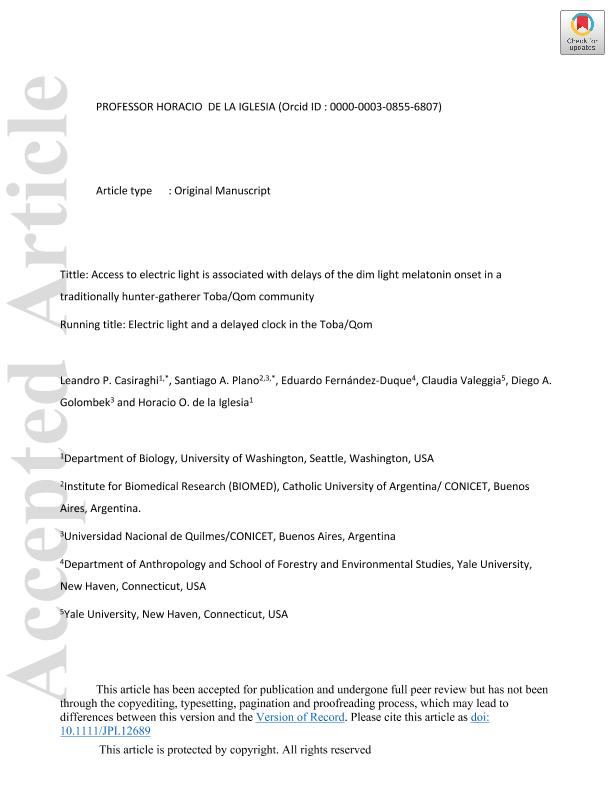Artículo
Access to electric light is associated with delays of the dim-light melatonin onset in a traditionally hunter-gatherer Toba/Qom community
Casiraghi, Leandro Pablo ; Plano, Santiago Andrés
; Plano, Santiago Andrés ; Fernandez Duque, Eduardo
; Fernandez Duque, Eduardo ; Valeggia, Claudia Rita
; Valeggia, Claudia Rita ; Golombek, Diego Andres
; Golombek, Diego Andres ; de la Iglesia, Horacio Oscar
; de la Iglesia, Horacio Oscar
 ; Plano, Santiago Andrés
; Plano, Santiago Andrés ; Fernandez Duque, Eduardo
; Fernandez Duque, Eduardo ; Valeggia, Claudia Rita
; Valeggia, Claudia Rita ; Golombek, Diego Andres
; Golombek, Diego Andres ; de la Iglesia, Horacio Oscar
; de la Iglesia, Horacio Oscar
Fecha de publicación:
08/2020
Editorial:
Wiley Blackwell Publishing, Inc
Revista:
Journal of Pineal Research
ISSN:
0742-3098
Idioma:
Inglés
Tipo de recurso:
Artículo publicado
Clasificación temática:
Resumen
Key to the transition of humans from nomadic hunting-gathering groups to industrialized and highly urbanized societies was the creation of protected and artificially lit environments that extended the natural daylight hours and consolidated sleep away from nocturnal threats. These conditions isolated humans from the natural regulators of sleep and exposed them to higher levels of light during the evening, which are associated with a later sleep onset. Here, we investigated the extent to which this delayed timing of sleep is due to a delayed circadian system. We studied two communities of Toba/Qom in the northern region of Argentina, one with and the other without access to electricity. These communities have recently transitioned from a hunting-gathering subsistence to mixed subsistence systems and represent a unique model in which to study the potential effects of the access to artificial light on sleep physiology. We have previously shown that participants in the community with access to electricity had, compared to participants in the community without electricity, later sleep onsets, and shorter sleep bouts. Here, we show they also have a delayed dim-light melatonin onset (DLMO). This difference is present during the winter but not during the spring when the influence of evening artificial light is likely less relevant. Our results support the notion that the human transition into artificially lit environments had a major impact on physiological systems that regulate sleep timing, including the phase of the master circadian clock.
Archivos asociados
Licencia
Identificadores
Colecciones
Articulos(SEDE CENTRAL)
Articulos de SEDE CENTRAL
Articulos de SEDE CENTRAL
Citación
Casiraghi, Leandro Pablo; Plano, Santiago Andrés; Fernandez Duque, Eduardo; Valeggia, Claudia Rita; Golombek, Diego Andres; et al.; Access to electric light is associated with delays of the dim-light melatonin onset in a traditionally hunter-gatherer Toba/Qom community; Wiley Blackwell Publishing, Inc; Journal of Pineal Research; 69; 4; 8-2020; 1-18
Compartir
Altmétricas



